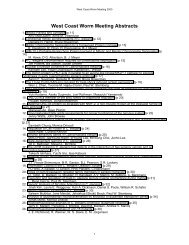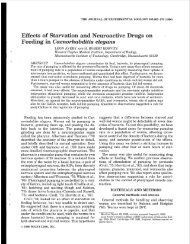- Page 1 and 2: Program of the 2004 East Coast Worm
- Page 3 and 4: 32. Frogs and snails and puppy dog
- Page 5 and 6: 63. Characterization of the Synthet
- Page 7 and 8: 98. Experimental Design for C. eleg
- Page 9 and 10: 134. Form and function of glia-neur
- Page 11 and 12: 168. Global transcriptional changes
- Page 13 and 14: 203. Transcriptional regulation and
- Page 15 and 16: 238. EGL-26 controls vulF morphogen
- Page 17 and 18: 274. Tracking the mid-life crisis o
- Page 19 and 20: 2. Two controls of FBF expression i
- Page 21 and 22: 4. The NR4A nuclear receptor is req
- Page 23 and 24: 6. Sperm-oocyte interactions in C.
- Page 25 and 26: 8. A Vesicle-Budding Model for the
- Page 27 and 28: 10. RGS-7 Completes a Receptor-inde
- Page 29 and 30: 12. Automated production of standar
- Page 31 and 32: 14. Enhancers of ksr-1 lethality de
- Page 33 and 34: 16. eak (enhancer-of-akt-1) genes e
- Page 35 and 36: 18. Control of aging and developmen
- Page 37 and 38: 20. Regulation of chemoreceptor gen
- Page 39 and 40: 22. Genes Involved In Serotonergic
- Page 41: 24. KEL-8, a novel Kelch-like prote
- Page 45 and 46: 28. UNC-55, a Nuclear Receptor, is
- Page 47 and 48: 30. A genomic approach to the devel
- Page 49 and 50: 32. Frogs and snails and puppy dog
- Page 51 and 52: 34. Caenorhabditis phylogeny predic
- Page 53 and 54: 36. cdc-14 regulates cki-1 to contr
- Page 55 and 56: 38. EPS-8 regulates LET-23/EGFR loc
- Page 57 and 58: 40. PKC2 A Calcium-Diacylglcerol Ki
- Page 59 and 60: 42. LIN-28 and LIN-46 converge at a
- Page 61 and 62: 44. An FGF Signaling Pathway Regula
- Page 63 and 64: 46. MLS-2, an HMX class homeodomain
- Page 65 and 66: 48. Mutations in him-8 suppress dev
- Page 67 and 68: 50. Characterization and cloning of
- Page 69 and 70: 52. RME-6 is a new regulator of Rab
- Page 71 and 72: 54. An Essential Role for HTP-3, a
- Page 73 and 74: 56. Genetics of telomere replicatio
- Page 75 and 76: 58. Identification and Characteriza
- Page 77 and 78: 60. Octopamine Inhibits Pharyngeal
- Page 79 and 80: 62. The let-7 and mir-35 Families o
- Page 81 and 82: 64. met-1 and met-2, Two Putative H
- Page 83 and 84: 66. Alterations of the C. elegans E
- Page 85 and 86: 68. Association of Oscheius species
- Page 87 and 88: 70. Genome-wide RNAi screen to iden
- Page 89 and 90: 72. Towards cloning mutations isola
- Page 91 and 92: 74. Study of the genetic and cellul
- Page 93 and 94:
76. A Genetic Screen for New Genes
- Page 95 and 96:
78. A germline-specific RNA-binding
- Page 97 and 98:
80. Development of high-throughput
- Page 99 and 100:
82. Modulations of thermotactic beh
- Page 101 and 102:
84. Temporal regulation of postmito
- Page 103 and 104:
86. Functional analysis of AMPA-typ
- Page 105 and 106:
88. D1- and D2-like dopamine recept
- Page 107 and 108:
90. GUM-1, a protein affecting the
- Page 109 and 110:
92. Translational control in the ge
- Page 111 and 112:
94. An Investigation into the poten
- Page 113 and 114:
96. Characterization of the DTC nic
- Page 115 and 116:
98. Experimental Design for C. eleg
- Page 117 and 118:
100. An HCP-6 Suppression Screen fo
- Page 119 and 120:
102. Function of a novel protein EF
- Page 121 and 122:
104. Mapping transcription regulato
- Page 123 and 124:
106. A genetic screen for mutants d
- Page 125 and 126:
108. A novel mutant that partially
- Page 127 and 128:
110. SMA-9, a Protein Involved in P
- Page 129 and 130:
112. CeMyoD(hlh-1) in embryonic mus
- Page 131 and 132:
114. Barotaxis Chris Gabel, Alex Da
- Page 133 and 134:
116. spe-19, a Gene Affecting Sperm
- Page 135 and 136:
118. An in vivo analysis of age-rel
- Page 137 and 138:
120. Functional Characterization of
- Page 139 and 140:
122. RecQ Helicases, Genomic Stabil
- Page 141 and 142:
124. The genes tra-4 and mog-7 are
- Page 143 and 144:
126. LON-2 is a glypican heparan su
- Page 145 and 146:
128. High Throughput TILLING, Ecoti
- Page 147 and 148:
130. Visualizing activity of C. ele
- Page 149 and 150:
132. An RNAi-based suppressor scree
- Page 151 and 152:
134. Form and function of glia-neur
- Page 153 and 154:
136. COMPUTER MODELING, SIMULATION
- Page 155 and 156:
138. Genetic variation reveals diff
- Page 157 and 158:
140. Guidance and cell-matching of
- Page 159 and 160:
142. Combinatorial control of lin-4
- Page 161 and 162:
144. GNA-2, Chitin and the Function
- Page 163 and 164:
146. Cytological screening of the g
- Page 165 and 166:
148. Genes controlling the developm
- Page 167 and 168:
150. Characterization of sel-6, a s
- Page 169 and 170:
152. Expression, function and regul
- Page 171 and 172:
154. nhr-67 and nhr-111, two NR2E n
- Page 173 and 174:
156. Sex-specific centrosome inheri
- Page 175 and 176:
158. The Regulation of the CDC-6 Re
- Page 177 and 178:
160. Identification of CUL-4 comple
- Page 179 and 180:
162. A screen for suppressors of cy
- Page 181 and 182:
164. Reiteration of a lineage branc
- Page 183 and 184:
166. A him-8 mutation suppresses th
- Page 185 and 186:
168. Global transcriptional changes
- Page 187 and 188:
170. sma-9, A Gene that Regulates B
- Page 189 and 190:
172. CaM KII Regulates Neurotransmi
- Page 191 and 192:
174. End-to-end chromosome fusions
- Page 193 and 194:
176. Genetic Analysis of the Putati
- Page 195 and 196:
178. Nog mutants and early germline
- Page 197 and 198:
180. The molecular analysis of ego-
- Page 199 and 200:
182. n3263 is a mutant with persist
- Page 201 and 202:
184. EGL-32 Functions in Sperm to R
- Page 203 and 204:
186. him genes and X chromosome mei
- Page 205 and 206:
188. Functional Analysis of the Mic
- Page 207 and 208:
190. Analysis of an UNC-13 protein
- Page 209 and 210:
192. Identification of genes regula
- Page 211 and 212:
194. Uncovering the role for sperm
- Page 213 and 214:
196. Evidence that lin-35 Rb functi
- Page 215 and 216:
198. A germline-specific cell cycle
- Page 217 and 218:
200. High throughput genetic screen
- Page 219 and 220:
202. Some Dauer Formation, Social F
- Page 221 and 222:
204. Characterization of mutants de
- Page 223 and 224:
206. The Identification of Factors
- Page 225 and 226:
208. Investigating interacting part
- Page 227 and 228:
210. A screen for axon branching an
- Page 229 and 230:
212. Components of the dosage compe
- Page 231 and 232:
214. Characterization of UNC-43/CaM
- Page 233 and 234:
216. Histone variant H2A.Z is essen
- Page 235 and 236:
218. DKF-1 is A Diacylglycerol-regu
- Page 237 and 238:
220. Dissecting the role of CNK-1 i
- Page 239 and 240:
222. C. elegans rme-3 encodes a cla
- Page 241 and 242:
224. The mutation bc202 blocks phys
- Page 243 and 244:
226. The BarH Class Homeodomain Gen
- Page 245 and 246:
228. Toward expression and biochemi
- Page 247 and 248:
230. The Unfolded Protein Response
- Page 249 and 250:
232. Regulation of gene expression
- Page 251 and 252:
234. Move or Die: Epidermal Migrati
- Page 253 and 254:
236. How are cytoplasmic asymmetrie
- Page 255 and 256:
238. EGL-26 controls vulF morphogen
- Page 257 and 258:
240. The Wnt genes egl-20 and cwn-1
- Page 259 and 260:
242. SRY-box containing protein SOX
- Page 261 and 262:
244. Genetic screen for factors fun
- Page 263 and 264:
246. Suppressors of pha-4/FoxA loss
- Page 265 and 266:
248. Genetic Screens for Suppressor
- Page 267 and 268:
250. Half-molecule ATP-binding cass
- Page 269 and 270:
252. Modifiers of polyglutamine-med
- Page 271 and 272:
254. Regulation of Cell Death in th
- Page 273 and 274:
256. Regulation of RNA Polymerase I
- Page 275 and 276:
258. Identification of regulatory s
- Page 277 and 278:
260. The nuclear receptor gene fax-
- Page 279 and 280:
262. sid-5 is required for robust e
- Page 281 and 282:
264. MSP signals microtubule reorga
- Page 283 and 284:
266. Functional genomic characteriz
- Page 285 and 286:
268. Alteration of Pax protein DNA
- Page 287 and 288:
270. Characterizing the Cell Biolog
- Page 289 and 290:
272. Identification and characteriz
- Page 291 and 292:
274. Tracking the mid-life crisis o
- Page 293 and 294:
276. Abstract for Leica Microsystem
- Page 295 and 296:
Boxem, Mike 79, 162 Boyd, Windy A 8
- Page 297 and 298:
Fukushige, Tetsunari 112 Fukuto, Ha
- Page 299 and 300:
Kao, Gautam 148 Karakuzu, Ozgur 149
- Page 301 and 302:
McClinic, Karissa 215 McDermott, Jo
- Page 303 and 304:
Roehrig, Casey 34 Rongo, Chris 86 R
- Page 305 and 306:
Tyler, Carolyn 30, 245 Ugel, Nadia




